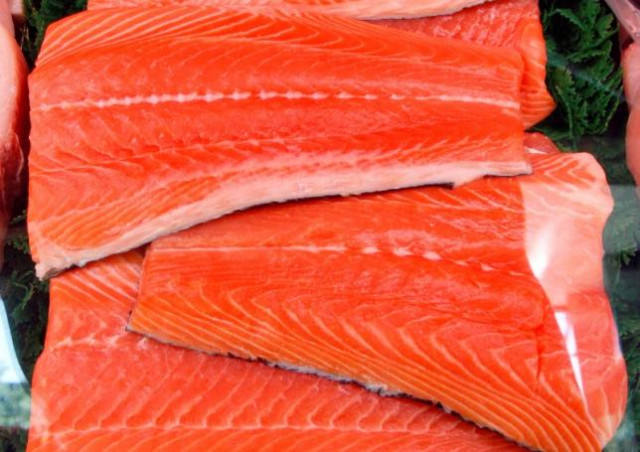Genetically-modified salmon safe to eat, says US
Genetically-modified salmon to be the first transgenic animal suitable for human consumption

PHOTO: REUTERS
The Food and Drug Administration's decision came after years of controversy over the fish, which is an Atlantic salmon injected with a gene from Pacific Chinook salmon to make it grow faster.
Best cure: Fresh juices avert dengue, advises health official
The fish, called AquAdvantage Salmon, is made by AquaBounty Technologies in Massachusetts, and can reach adult size in 16 to 18 months instead of 30 months for normal Atlantic salmon.
"They have met the regulatory requirements for approval, including that food from the fish is safe to eat," said Bernadette Dunham, director of the FDA's Center for Veterinary Medicine.
Regulators "determined that food from AquAdvantage Salmon is as safe to eat and as nutritious as food from other non-GE (genetically engineered) Atlantic salmon," the FDA said.
"There are no biologically relevant differences in the nutritional profile of AquAdvantage Salmon compared to that of other farm-raised Atlantic salmon."
Food security: Farmers get free seeds for sustainability
AquAdvantage Salmon may be raised only in land-based, contained hatchery tanks in two specific facilities in Canada and Panama.
The FDA approval does not allow AquAdvantage Salmon to be bred or raised in the United States.
Some consumer groups have opposed the fish, saying it could be dangerous to human health and may pose risks to other fish if it were to escape into the environment.
However, the FDA noted that the AquAdvantage salmon "are reproductively sterile so that even in the highly unlikely event of an escape, they would be unable to interbreed or establish populations in the wild."
Those who sell the fish are not required to label it as genetically modified, because under US law, such additional labeling can only be required if there is a "material difference, such as a different nutritional profile" between the genetically-modified product and its natural counterpart.
"In the case of the AquAdvantage Salmon, the FDA did not find any such differences," it said.
The FDA did release recommendations for those who wish to voluntarily label the salmon as genetically altered.
If consumers want to make sure they are not eating genetically altered salmon, they should purchase fish that is labeled "wild-caught," a spokesperson for the agency told reporters.
The Consumers Union, which has long opposed the altered fish, said it was "deeply disappointed with the FDA's decision."
The lack of mandatory labeling is a key problem, said Michael Hansen, senior scientist with the group.
Authenticated Wheat Seeds: Food security programme launched
"Consumers deserve to know what type of food they're buying -- and an overwhelming majority has told us that they want genetically modified food labeled in poll after poll," he said in a statement.
The approval was largely hailed by scientists, including Alison Van Eenennaam, an animal geneticist at the University of California, Davis, who said the FDA decision was "long overdue."
"AquaBounty has been attempting to get regulatory approval for the AquAdvantage salmon for almost two decades," said Van Eenennaam, who was a member of advisory committee that looked at the AquaBounty salmon for the FDA in 2010.
"Five years ago, FDA scientists determined that the food from AquAdvantage salmon was 'as safe as food from conventional salmon' and that the proposed physical, biological and genetic confinement of the fish in the highlands of Panama posed minimal environmental risk," she said.
According to William Muir, a professor of genetics at Purdue University, the decision is a "huge win-win for the environment, consumers and the process."
"There is no credible evidence that these fish are a risk to either human health or the environment," Muir said.
"In contrast, the current practice of using wild-caught salmon as a food source is not sustainable. Our oceans are overfished."



















COMMENTS
Comments are moderated and generally will be posted if they are on-topic and not abusive.
For more information, please see our Comments FAQ